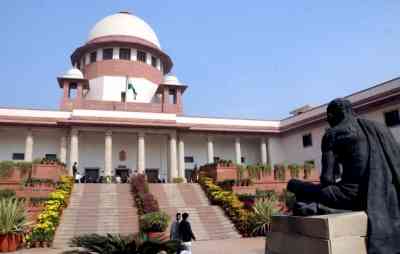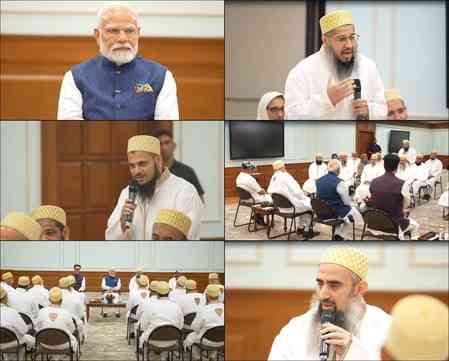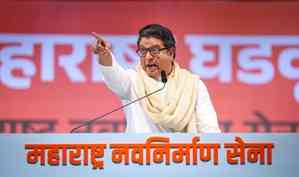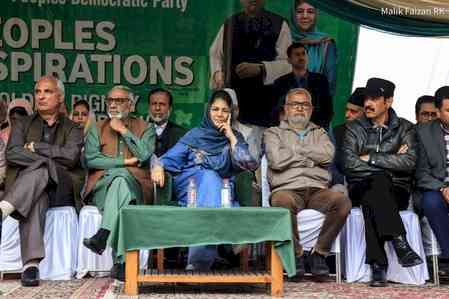How many times did Parliament discuss conduct of Speaker, SC asks Uddhav faction
The Supreme Court on Tuesday shot a volley of questions at the Uddhav Thackeray faction, asking how many times did the Parliament discuss a review of the conduct of the Speaker, why is that question raised before the court, and also, why should the court change rules just because one or two Speakers went astray.

New Delhi, Feb 21 (IANS) The Supreme Court on Tuesday shot a volley of questions at the Uddhav Thackeray faction, asking how many times did the Parliament discuss a review of the conduct of the Speaker, why is that question raised before the court, and also, why should the court change rules just because one or two Speakers went astray.
Senior advocate Kapil Sibal, representing the Uddhav Thackeray faction, submitted before a five-judge constitution bench, headed by Chief Justice of India D.Y. Chandrachud, that "your lordships have great confidence in the constitutional office of the Speaker but do they discharge this confidence?"
At this, the Chief Justice replied: "You also have that confidence when you say that the Speaker has to decide the disqualification petitions... that is not dependent on who is the Speaker, Mr Sibal". He added that the constitutional authority of the Speaker to decide is not based on who the Speaker is.
Sibal said the a Speaker who appoints the whip and Leader of the Opposition without reference to the political party, "you think he can decide in my favour, there is no way!"
The Chief Justice said: "The first Speaker in defiance of legislative rules gave two days' notice... this is the way everybody is behaving. There are two options: either you debunk the authority of the Speaker or.. in a democracy you value the office of the institution... denigrating constitutional offices including the office of the Speaker."
When Sibal said they are denigrating themselves, the bench -- also comprising Justices M.R. Shah, Krishna Murari, Hima Kohli and P.S. Narasimha -- said: "It is a race to the bottom then."
Justice Narasimha told Sibal: "Legislators, parliamentarians.... decided upon the Speaker to be the tribunal.. it is parliamentarians' decision, the Tenth Schedule. Therefore, the court is only interpreting that..."
Sibal referred to the decision of the apex court on 27 June last year, where the court granted interim relief to Shinde faction by extending the time to file responses to the disqualification notices. It later, on June 29, gave the go-ahead to a floor test called by the Governor.
Justice Narasimha orally observed: "On one hand if the Speaker is with you, you would say it is a constitutional authority. What is wrong with it... if you have some difficulty, you mean, not you. Look at the way Speakers have behaved. For us, as long as the constitution bench judgment is there, we will go by the fact that the Speaker is the tribunal."
The bench further added that the Speaker is the presiding officer as per Tenth Schedule and "we will not go back on the decision, that is the final decision, as far as we are concerned".
Sibal replied by that logic, the June 27 order could not have been passed, and that is what led to what way we are today.
Justice Kohli said that if one or two Speakers have gone astray, would the court be inclined to debunk the whole procedure as laid down and the Tenth Schedule?
To this, Sibal said: My intention is not that, I have been telling what is happening." Justice Kohli said then it is a conundrum. Sibal said: "Yes, it is a conundrum, a constitutional conundrum and somebody has to sort it out."
At this juncture, justice Narasimha said: "Another question, every time this question is raised before the court. I would want to ask you how many times did the parliamentarians raise this question in the Parliament saying let us actually amend the Constitution."
"How many times did the discussion take place in the Parliament to review the conduct of the Speaker. Why is that question raised before the court, which is not a forum for consideration. how many times parties have sat down together and decided this is not working?" he asked.
"Once Kihoto Hollohan was rendered then," Sibal said referring to the apex court verdict in the 1992 case, upholding the sweeping discretion available to the Speaker in deciding cases of disqualification of MLAs.
Justice Narasimha replied: "Why, it only upheld the Tenth Schedule. It is your making, the Tenth Schedule. This will take us nowhere, Mr Sibal. Frankly, unless there is an amendment to the Constitution, there is a reference, a direct challenge..."
The top court made these observations while dealing with Maharashtra political crisis triggered due to rebellion in the Shiv Sena. It will continue to hear the matter on Wednesday.
On February 17, the apex court had declined to make immediate reference to a seven-judge bench the reconsideration of its 2016 Nabam Rebia judgment, which restricted the power of the Speaker to examine disqualification petitions against MLAs if a resolution for his removal is pending.
A five-judge bench headed by Chief Justice of India said the issue of reference will be decided only with the merits of the case and fixed the matter for hearing on merits on February 21.


 IANS
IANS 








